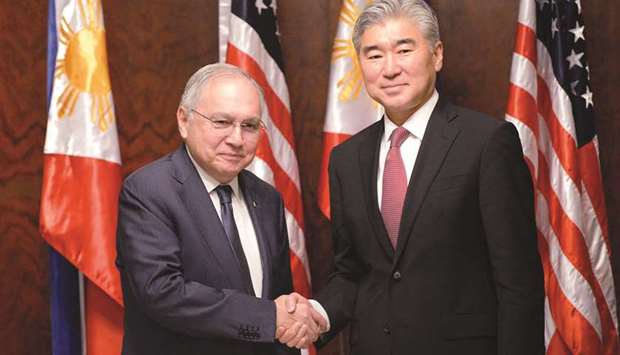The Philippines and the US yesterday reaffirmed their commitment to uphold freedom of navigation, overflight and other lawful uses of the South China Sea (SCS) or West Philippine Sea (WPS).
The department of foreign affairs made the announcement after Manila and Washington concluded their two-day 8th Bilateral Strategic Dialogue (BSD).
The discussions between Foreign Affairs Secretary Teodoro Locsin Jr and US Secretary of State Michael Pompeo in March 2019 and the joint statement resulting from the meeting in Manila between President Rodrigo Duterte and US President Donald Trump in November 2017 provided strategic direction to the dialogue.
“Both sides recognised the importance of a strong Philippines-US alliance in enhancing security co-operation and promoting regional stability and prosperity,” the DFA said.
“Both sides also emphasised the importance of concluding an effective and substantive code of conduct that would not prejudice the rights under international law of both claimant states and non-claimant states in the SCS,” it added.
Foreign affairs undersecretary for policy Enrique Manalo and defence undersecretary Cesar Yano co-led the Philippine delegation.
Meanwhile, assistant secretary of state for East Asian and Pacific Affairs, David Stilwell, and assistant secretary of defence for Indo-Pacific Security Affairs, Randy Schriver, led the US delegation.
The BSD is the principal forum for discussions of political, security and economic co-operation between the Philippines and the US, comprising four working groups — defence and security; economics, development and prosperity; regional and global diplomatic engagement; and rule of law and law enforcement.
Philippines ambassador to Washington, Jose Manuel Romualdez, confirmed that the WPS issue was discussed during the BSD.
“I think for the defence portion of the working group on defence and security that was obviously discussed on how we can continue to strengthen our relationship. But, in general terms, the relationship is there, (it’s) very strong,” Romualdez said in an interview.
Philippine and US senior officials discussed a wide variety of issues of mutual interest and reaffirmed their commitment to deepen alliances and expand areas of co-operation.
The Philippines and the US pledged to enhance their already robust defence co-operation by improving defence infrastructure, updating personnel and logistics procedures, and increasing mutual communication and co-ordination on operational elements of regional security.
“In this context, both sides commit to begin planning on a range of activities to improve maritime domain awareness,” the DFA said. Both countries also reaffirmed their commitment to deepen the extensive economic relationship and undertook substantive discussions on co-operation in areas such as science and technology, agriculture, fisheries, health, environment, energy, infrastructure, connectivity and cybersecurity, among others.
The Philippines and the US recognised the importance of the bilateral Trade and Investment Framework Agreement, which has enabled both countries to make concrete and significant progress on outstanding bilateral trade issues.
The Philippine and US delegations emphasised the importance of the rule of law, human rights and fundamental freedoms.
The senior officials pledged to continue working together to effectively eliminate human trafficking and to collaborate more closely on enhancing legal aid services, as well as on countering transnational crimes such as human and drug trafficking.
The officials pledged to deepen their work to counter terrorism and violent extremism through improved information sharing, and port and aviation security, in order to prevent terrorist attacks within the Philippines, and the transit of foreign terrorist fighters into and within the country.
The US acknowledged the importance of the Association of Southeast Asian Nations (Asean) Outlook on the Indo-Pacific and recognised Asean centrality as integral to its Indo-Pacific strategy.
Both sides committed to deepen their engagement with partners in the region based on inclusiveness, openness, rule of law, good governance and respect for international law.
In support of the alliance, the US announced a new “Philippines-US Alliance Fellowship” for young Philippine scholars.
Both sides have taken steps to strengthen cultural exchanges, including developing a joint pilot project to support teachers going to the US.
At the conclusion of the BSD, the Philippines and the US signed a joint statement on higher education co-operation and a science and technology agreement.

The US ambassador to the Philippines, Sung Kim (right), shakes hands with the Philippine ambassador to the US, Jose Manuel Romualdez, after a joint press conference at the conclusion of u201c8th Bilateral and Strategic Dialogueu201d at a hotel in Manila yesterday.
